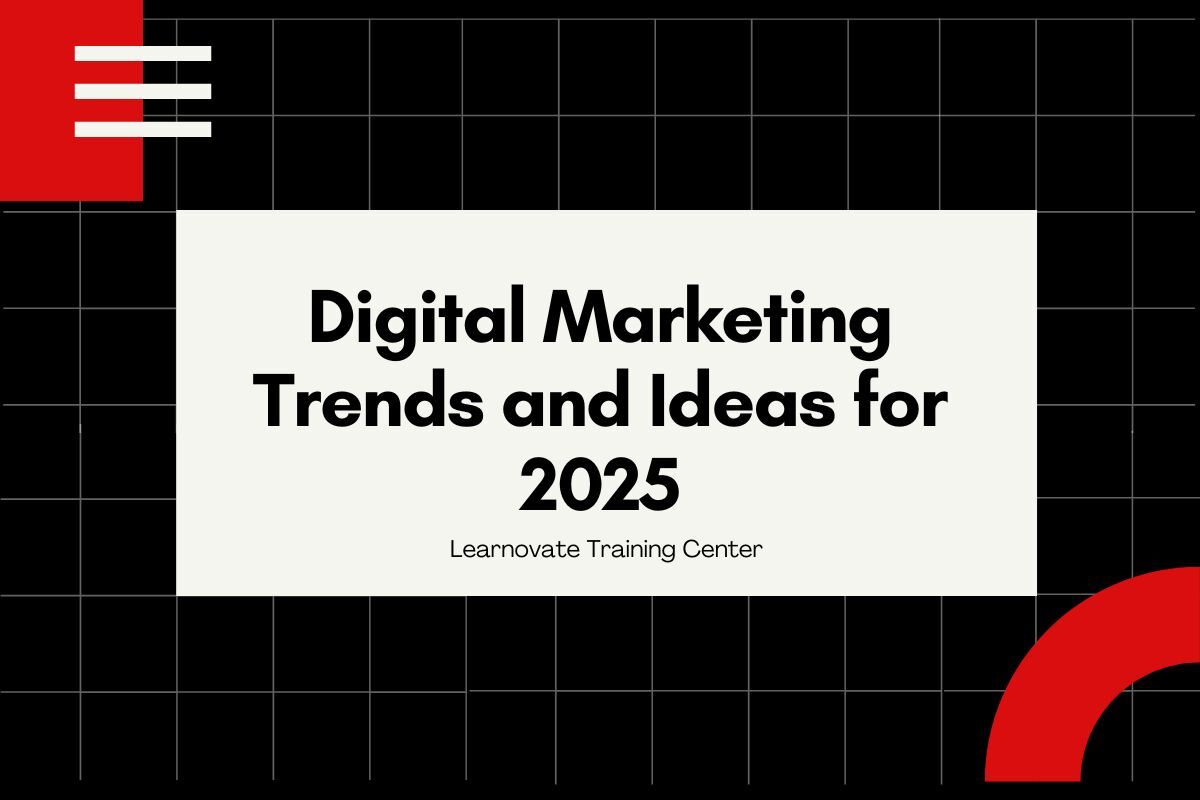Businesses today need to keep up with the latest strategies and trends. Whether you’re considering a digital marketing course, interested in the latest digital marketing trends, looking for new digital marketing ideas, or seeking comprehensive digital marketing training, one thing is clear: to succeed this year, embracing the latest innovations in digital marketing is crucial.
We’ve compiled insights and ideas for 2025 to help you outshine competitors and boost website traffic.
Dive into our guide to learn how to market your business effectively online throughout the year.
-
AI-Powered Personalization
As technology advances, it’s no secret that Artificial Intelligence (AI) will play a significant role in shaping the future of personalized marketing experiences.
By analyzing data and tracking customer behavior, businesses can use AI-powered personalization to deliver more relevant content, offers, and recommendations to their target audience.
The rise of AI means customers can expect a more seamless and hyper-personalized shopping experience, where brands can cater to each individual’s unique preferences and expectations.
From curating personalized product recommendations based on customer browsing history to optimizing email campaigns, AI-powered personalization is revolutionizing how we think about customer engagement.
-
Social Media and Influencer Marketing
In digital marketing, the fusion of social media and influencer marketing is emerging as a potent force reshaping brand-consumer relationships. This trend harnesses the power of authentic content creators to engage audiences and drive business goals effectively.
Platforms like Instagram, TikTok, and YouTube are witnessing a surge in partnerships between brands and influencers, resulting in highly targeted and relatable marketing campaigns.
For instance, fitness brands collaborate with fitness influencers to showcase products in action, while lifestyle brands collaborate with travel influencers for captivating content that resonates with their audience.
This trend is marked by the ability of influencers to seamlessly integrate products into their content, fostering genuine connections and boosting brand credibility.
-
Voice Search Optimization
In the past, typing in your search queries on a keyboard was the norm. But with the rise of voice-assisted devices such as Siri, Alexa, and Google Assistant, more people are now using voice search to find what they are looking for online.
This means that digital marketers need to start thinking about optimizing their content for this new trend.
Voice Search Optimization (VSO) has become a critical tool for ensuring that your website or online business remains visible in search results. By adapting to this trend, you can improve your chances of being found by new customers and increase your brand’s awareness.
-
Video-first Strategy
Video-first strategy is quickly becoming a must-have tool for businesses. It’s no longer enough to rely solely on text-based content – video content captures audiences’ attention and encourages engagement.
Short-form videos, live streaming, and interactive videos are just a few examples of the types of video content that are gaining popularity.
By incorporating a video-first approach, businesses can effectively communicate their message and stand out. By creating engaging and visually stimulating content, businesses can expand their reach and interact with their audience in new and exciting ways.
-
Augmented Reality (AR) Marketing
Imagine seeing how a product will look and feel in your own space before making a purchase. With augmented reality (AR) marketing, this is now possible. AR technology allows brands to create immersive experiences that let customers interact with virtual elements in real-world settings.
By leveraging AR, brands can provide customers with a unique shopping experience that engages their senses and facilitates informed decision-making. From trying out furniture in your living room to previewing makeup on your face, the possibilities with AR are endless.
As digital marketing evolves, it’s clear that AR is becoming an increasingly valuable tool for brands looking to engage with customers in innovative ways.
-
Inclusive and Ethical Marketing
The rise of social consciousness has led to a shift in consumer expectations from the brands they choose to support. Inclusive and ethical marketing has become a vital digital marketing tool, with consumers emphasizing a brand’s authenticity when promoting diversity and sustainability.
By embracing inclusivity and ethical practices, brands can connect with their target audience and stand out in the crowded marketplace.
-
Ephemeral Content
Ephemeral content is quickly becoming a go-to digital marketing tool for businesses of all sizes. With platforms like Instagram and Snapchat, companies can create authentic, eye-catching content that encourages frequent user engagement.
The temporary nature of these stories also adds a level of urgency, encouraging users to act quickly and take advantage of exclusive promotions or content.
It’s no wonder why ephemeral content continues to be popular among brands who want to connect with their audience uniquely and authentically.
-
Interactive Content
As the digital space expands, interactive content becomes an increasingly popular tool for brands to promote their products and services.
Gamified quizzes, polls, and interactive infographics are just a few examples of how businesses uniquely engage their audiences. By encouraging active participation, brands enhance user engagement and build brand affinity.
Beyond traditional marketing techniques, interactive content creates a two-way conversation that can be fun and informative, leading to a more memorable experience for the consumer. With the demand for unique and personalized content on the rise, interactive tools allow businesses to stand out from the crowd and connect with their target audience on a deeper level.
-
Micro-Moments Marketing
In the fast-paced digital landscape of 2025, micro-moment marketing is emerging as a pivotal strategy. This approach recognizes the growing trend of users turning to their devices for swift solutions to immediate queries.
To succeed, brands must deliver concise yet relevant content that addresses these micro-moments, making each interaction valuable and memorable.
Imagine a user searching for a last-minute dinner idea. A food brand effectively uses a Micro-Moments Marketing strategy by delivering a concise video recipe on social media platforms like Instagram or TikTok. In just a 30-second clip, the brand showcases an easy-to-make and tasty dish using its products.
-
Zero-Party Data Strategy
The latest emerging tool that is garnering attention is the Zero-Party Data Strategy. This strategy involves brands directly collecting explicit customer data rather than relying solely on third-party data. By doing so, brands can foster customer trust and deliver more accurate personalization.
This approach ensures that customers have more control over their data and allows brands to gain deeper insights into their customer base.
With more accurate and reliable data, brands can tailor their marketing efforts to truly resonate with their audience, leading to better engagement and, ultimately, stronger customer relationships.













